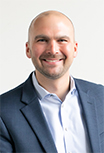Are We Being Good Ancestors?
By Luke Fischer

A couple of months ago, I heard Minnesota-based futurist Jack Uldrich reflect on a question originally posed by Jonas Salk, the developer of the polio vaccine: “Are we being good ancestors?” That question has been stuck in my mind ever since and I’ve been wondering about how we’re doing as a society. So, I decided to look around and see if I could find any indicators on our trajectory.
To start, I flipped on the news. I tried the local stations and surfed around the cable networks. Regardless of what you think or what you believe, the news was dire. If you listen to the coverage, you will conclude that we’ve forgotten how to work together and compromise. There was a lot of blame, “us” versus “them,” and a lot of charged language about this person or that idea ruining the country. Bleak.
When I turned to the newspapers, there was some wonky analysis about how treasuries are trading and impacting the markets (OK, to be fair, it was the Wall Street Journal). The coverage of local land use decisions seemed to focus on technicalities and exceptions — rather than the public good that these rules are intended to preserve. Uninspiring.
And then I scrolled through social media. Maybe this whole exercise was a mistake.
My day started to brighten, though, when I got to work and saw the stack of about 500 essays, piled on a conference table, from Minnesota students in grades four through six who wrote about what they would do if they were a mayor. They were from kids who aren’t encumbered by the markets, legal concerns, or other things that consume adults. Instead of worrying about the details, these future leaders were focused on the great opportunities mayors (and all of us working in the public sector) have to be good ancestors.
What did that look like?
Anita from Fridley wants to focus on hearing from the right people. “If I were mayor for a day, I would create a Community Kids Committee (CKC) to be in charge of reviewing the local parks, gardens, and activities. They would see how much fun they are and if they feel safe. It would be a kids only group and they would also raise money for any changes that the CKC may want and for kids who need help paying for certain activities. This would be important because no one knows what kids want more than kids do.”
Kenzie from New York Mills thinks it’s important for us to have good public places and opportunities to gather. “I would make a library recognized. I would let people know where the library is located. I would have them check it out by throwing a play at the library. I would have people bring their kids. I would encourage them to go to the things they offer, like when they have events going on in the summer.”
Noe from Minneapolis wants to engage everyone to take care of our natural resources. “I think we should start an optional lake clean-up service for all of the lakes that people live by. It would be very beneficial to our community. I already go down in the summer to pick up trash, but it would be great if some other people would be there. The city could fund gloves and trash bags. I also think we could put more signs up that say, “Pick Up After Yourself!” I see a few but not enough, and I don’t really see people following them.”
You’ll see similar themes from our essay contest award winners in this issue.
I think these essays give us all the chance to take a step back from our day to day and see, through a different lens, the opportunity to serve the communities we love. By inviting people to participate, by giving people a chance to gather, we share the responsibility we have to one another to make the places we live great. Just like Anita, Kenzie, and Noe.
Back to Salk. His life’s philosophy reflects the promise of the future found in these future mayor essays: “Hope lies in dreams, in imagination and in the courage of those who dare to make dreams into reality.” In the essays you’ll read in a few pages, I think you’ll agree we’ll be alright. Our kids are going to be good ancestors. The question for us is simple: Are we?
Luke Fischer is executive director of the League of Minnesota Cities. Contact: lfischer@lmc.org or (651) 281-1279.

